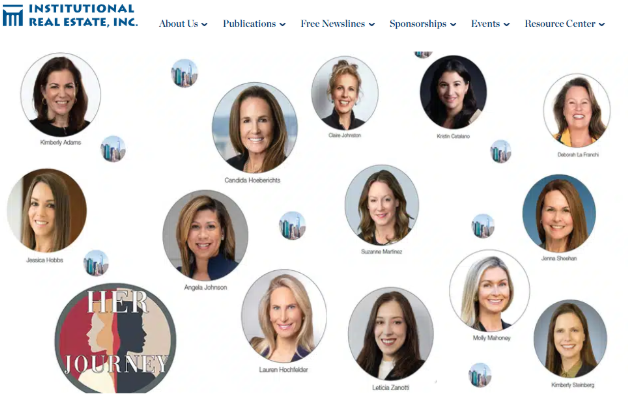Her Journey:
Women of real estate share their beginnings, achieving balance and views of the future for real estate
by Andrea Zander

This is the second year of our series featuring interviews with women in the real estate industry. The women highlighted come from diverse roles and represent a wide range of ages, showcasing the variety and opportunities within the industry. These inspiring professionals share their journeys into the sector, and their successes and challenges. They also offer advice for those aspiring to build a career in real estate.
The moment
There’s always a moment — or a person — that can change the course of someone’s path. It might be a decision to say yes or no, to show up or stay back, to turn left or right. These seemingly small, fleeting choices really are impactful. In this piece, our interviewees reflect on the pivotal moment or person that sparked their passion for real estate.
Several of the women were deeply inspired by family members who introduced them to real estate early in life.
Suzanne Martinez, managing director for the global investors group at Affinius Capital, reflects on the early influence that shaped her career, crediting her grandmother, who owned and operated a Century 21 real estate agency in Chicago’s Logan Square neighborhood.
“[My grandmother] was an immigrant from Puerto Rico, and she helped other immigrant families to buy their homes,” shares Martinez. “It was rare to see a woman running a real estate office, let alone be very successful at it. She saw the opportunities to help others get housing and start businesses in areas that people weren’t looking at.”
For Kristin Catalano, lead portfolio manager – core-plus residential strategy and separate accounts at DWS, her father’s role in shaping Chicago’s skyline as an electrician sparked her passion for real estate.
“My father was an electrician in Chicago for 40 years, and he worked on many of the skyscrapers that make up the city skyline,” she explains. “Growing up, he would sometimes drive me past the buildings that he, and many others, were constructing. I was fascinated with building something out of nothing and the resulting transformation of a city.”
Catalano’s career eventually brought her full circle, as she began working in some of the buildings her father had helped construct. “My career officially began as a leasing broker representing tenants in some of the same buildings my father built. There, I gained valuable experience in understanding the tenants’ perspective and the complexities inherent in lease negotiations,” she shares.
Angela Johnson, managing principal and head of global client solutions and strategic partnerships at Noble Investment Group, also credits her father for inspiring her career in real estate. Her father was a residential real estate broker, and from a young age, she accompanied him on property tours.
“I was probably the only kid who knew what a title agency or settlement day was because I associated those days with getting a new toy!” Johnson recalls. “Later, when I received my first investment banking analyst bonus, I called my dad and told him I wanted to buy an investment property. I purchased a single-family residential property in Houston and found so much joy in building rudimentary DCF models. It felt far more tangible than the complex financial models I was working on in my investment banking program, and that’s when I knew I wanted to pursue a career in real estate.”
Leticia Zanotti, head of asset management and real estate equity at Leste Group, shares a similar personal experience in homeownership that ignited a lasting passion for the industry.
“With a background in civil engineering, I always aspired to work in real estate, focusing on developing and renovating properties. When I moved to São Paulo, Brazil, and sought to purchase a condo, I noticed a significant price difference between old and renovated units. This sparked my interest in flipping these units, and I found immense satisfaction in creating spaces that people love and feel at home in,” says Zanotti.
Many of the women are also motivated by a desire to create change and contribute meaningfully to society.
Deborah La Franchi, founder and CEO of SDS Capital Group, has always been driven by a mission to improve the lives of those living in poverty. Reflecting on the start of her career in the mid-1990s, La Franchi recalls her time as assistant deputy mayor for economic development under Los Angeles Mayor Richard Riordan. “One day, my direct boss asked who wanted to help structure and raise a fund to invest in our inner-city communities,” she says. “My hand shot up immediately. I didn’t even know what private equity was at the time, but I was very excited. The rest is history!”
That moment marked a turning point in her career. At 26 years old, she found herself working alongside top industry leaders to structure and capitalize multiple private equity real estate funds, including the Genesis Workforce Housing Fund, one of the first workforce housing funds in the country.
In 2001, La Franchi founded SDS Capital Group, driven by a vision to engage the private sector in the fight against poverty. “We would do this by creating funds that — importantly —would deliver risk-adjusted rates of return while investing in critically needed affordable housing projects across the country,” she says.
Kimberly Steinberg, managing director, head of business development and investor relations at Transwestern, who started a career in finance in investor relations at hedge funds, followed by a credit asset management firm, shares a similar appreciation for the tangible and societal impact of real estate.
“What always interested me about real estate was its tangible nature — you can visit the properties and see their footprint and purpose firsthand — truly ‘kicking the tires,’ or bricks and mortar as the adage in our business goes,” says Steinberg.
She continues, “I draw inspiration from real estate as it plays a critical role in our society, shaped by human behaviors, preferences and needs. Understanding these dynamics and matching them with the goals of an investor is a rewarding challenge.”
A fascination with cities, buildings and urban development also unites many of the women.
Co-CEO of Morgan Stanley Real Estate Investing Lauren Hochfelder’s real estate journey began at an early age, growing up in New York City, where she observed how zoning policies shaped neighborhoods, industries transformed urban spaces and mixed-use developments created value. “Real estate was the nexus of so many of my interests — business, policy, anthropology and more,” she shares.
After joining Morgan Stanley straight out of college nearly 25 years ago, Hochfelder quickly discovered her love for investing while working as an analyst in both investment banking and real estate investing. “That’s when the real learning began,” she reflects. “As an analyst I worked in both investment banking and real estate investing. Pretty quickly, I knew I loved investing.”
Claire Johnston, CEO of Americas at Lendlease, describes her passion for real estate as rooted in the intricate ecosystems of cities and how they function.
“I’ve always been fascinated by cities. They are intricate ecosystems of people, places, stories, experiences and memories. Buildings, streets and waterways are where life is experienced,” she explains. “Soon after joining Lendlease, I knew that I wanted my career to contribute to cities in meaningful ways. I just didn’t know yet what that was!”
Johnston credits Lendlease for giving her the opportunity to grow and learn across various disciplines. “As an integrated group, Lendlease specializes in investment management, development and construction, so I was lucky to find an organization to learn and grow within. It was exciting taking on any project or activity that would increase my knowledge and skills,” she shares. “One of the most career-shaping experiences early on was leaving the comfort of headquarters to get out on construction sites. I learned design, project management and development management skills that helped me to understand real estate fundamentals as well as the importance of people management and stakeholder relationship skills. This time, together with postgraduate study in management and real estate, gave me a fantastic platform for career growth.”
Candida Hoeberichts, managing director of capital raising at BGO, for example, was drawn to real estate through her background in architecture.
“After college, I began my journey at an architectural and engineering firm, immersing myself in the intricacies of design and construction. A serendipitous conversation with a friend opened my eyes to the dynamic world of real estate, leading me to join Cushman & Wakefield in New York City, where I laid the cornerstone of my real estate career,” says Hoeberichts.
Hoeberichts’ career started at Cushman & Wakefield, which allowed her to gain insight into selling and leasing office buildings, and she later pursued a master’s degree in real estate finance at New York University. Her career expanded to include positions at Merrill Lynch, where she focused on debt, and eventually to the investment management side at RREEF (now DWS). Today, Hoeberichts works in investor relations at BGO, helping investors achieve their real estate goals.
Jenna Sheehan, senior managing director and head of investor relations – North America at Harrison Street, also began her real estate career thanks to an unexpected conversation: “After starting my career as an auditor at a public accounting firm, a pivotal opportunity arose through a college friend who referred me for an analyst role at her firm, leading me to the institutional real estate industry 28 years ago.
“The opportunity to merge my accounting and finance acumen with the tangible aspects of real assets immediately captured my interest and firmly established my path in the industry,” Sheehan shares.
And Molly Mahoney, managing director on the capital-raising team at Slate Asset Management, says networking literally changed the trajectory of her career.
“I landed in private equity real estate somewhat serendipitously. I had been in various capital-raising roles within hedge funds and traditional private equity shops for years when I met an old friend for lunch who was looking to fill a role and convinced me to give real estate a try,” shares Mahoney.
Jessica Hobbs, head of business development with the Mesa West Capital investor relations team, recalls when she was introduced to institutional real estate fundraising during an information interview at Colony Capital.
“Growing up in a small town in Kentucky, institutional real estate was not a commonly known career path, and this conversation changed my life. A few weeks later, I started as an investor relations associate, and the rest is history. Now I am thriving in a career that I not only enjoy but that allows me to work with inspiring people every day,” says Hobbs, who graduated as a financial analyst. Her first job was an $11 billion development of the Las Vegas City Center project, which was her introduction to working on an institutionally owned real estate project.
Mastering the balance
Achieving work-life balance is often described as the ultimate challenge, particularly in high-stakes, fast-paced industries such as real estate investment management. Several of these women reveal that balance isn’t about perfection but about making intentional choices, staying flexible and prioritizing what matters most.
Hochfelder admits, “I don’t ‘manage’ and wouldn’t characterize it as a balance. I love my work, and I love my life outside of work — and I thrive in the continuum between them.”
“The truth is I don’t believe there is a work-life balance. I remember Sheila Penrose, the former chairwoman of JLL, saying there is no such thing — you do the best you can, but it’s never going to be even. Sometimes you focus more on work; sometimes your focus has to shift back to home. I do think it’s important to make sure you have other outlets to avoid burnout; there is also inspiration that can come from the most unlikely places,” says Martinez.
This sentiment is echoed by La Franchi, who acknowledges, “I’m always working. But I’m not complaining. I can work from anywhere — so I’m not tethered to a desk. I believe there are periods where I have to focus more on work, and then there are periods where my focus is more on family. My goal is not to have a constant, ongoing balance at all times. For me, it is a bit more of a pendulum swinging between family/life and work, depending on the needs at that time.”
For Catalano, who is a mother of four young children, balance comes from being deliberate with her time. “I’ve learned that balance isn’t about perfection — it’s about making thoughtful choices and being present in whatever role I’m in. Parenting has taught me invaluable lessons in patience, adaptability and compassion, all of which make me a stronger leader.”
Similarly, Kimberly Adams, Clarion managing director, who started her career in real estate right out of college as an analyst at LaSalle Partners in Chicago in the mid-1990s, emphasizes the value of intentionality in how time is spent. “One very useful tip I have received along the way, especially for those of us with elementary school–aged children, is to be deliberate about where and how you spend your volunteer time. Don’t volunteer in places that aren’t visible to your children. Skip the PTA role and instead contribute to the school community by signing up to be a field trip mom, where your kids can see you and you have the chance to share something with them. Your time is inevitably more limited with a full-time career, particularly one that includes travel, so maximize that time.”
Johnston credits her ability to balance responsibilities to a strong partnership with her husband. “My husband and I are real partners, I would like to say 50-50, but he really carries 75 percent of the domestic load while running his own business. We are very deliberate about focusing our weekends around our two girls. I travel extensively, so being home and switched off by Friday afternoon is non-negotiable,” says Johnston.
Support also extends to colleagues and confidants, as Sheehan explains: “When I reach an inflection point and need to reflect on my work-life balance, I turn to my confidants — family for personal insights and colleagues who understand industry demands. With a clearer vision, effective time management and delegation become critical, allowing me to focus on strategic goals without being overwhelmed by day-to-day tasks.”
Amid the demands of career and family, self-care needs to be a priority as well. “Over time, I’ve recognized the importance of self-care and personal interests to maintain overall well-being. This balance has not only helped sustain my career but has also enabled me to lead more effectively, bringing empathy and understanding to my role,” says Sheehan.
Johnston acknowledges the role of physical and mental wellness in managing stress. “Consciously creating downtime and investing time and energy with people and activities that refill your cup works for me. Downtime brings clearer thinking and perspective to complex work problems,” says Johnston.
While the pursuit of work-life balance remains a challenge, many women have found that passion and alignment with personal values make the journey worthwhile. “Work-life balance becomes more manageable when you have a passion for what you do,” says Sheehan. “If it’s just a paycheck or if you don’t enjoy working with your colleagues, the balance may feel elusive, becoming counterproductive in both areas.”
Hoeberichts adds, “Finding the perfect work-life balance is a constant challenge, especially in such a fast-paced, demanding industry. … Each person’s balance is unique, and the key is navigating your career in a way that aligns with both professional aspirations and personal needs.”
Hobbs concludes, “I feel very lucky to have ‘stumbled’ into a career that I love. I often tell people that there will always be days where your job is hard and feels like work. However, if you find a job that you would continue to do even if you didn’t have to work, you are winning at life.”
Building change together
While the presence of women in the real estate sector has increased, their representation still lags behind compared with other industries.
Hochfelder shares how her perspective has evolved over time, emphasizing the value of gender diversity in real estate and having seen firsthand how a diverse team makes better decisions. “Real estate is the infrastructure that underlies how we live, work, shop and travel. Having both men and women involved leads to better judgments, especially when it comes to understanding shifting trends and behavioral patterns,” says Hochfelder. “Importantly, I’ve also realized the meaningful benefits — professionally and personally — of the relationships and bonds I’ve formed with incredible women in our industry.”
La Franchi emphasizes the importance of providing greater exposure and encouragement to women early in their careers to help bridge this gap. “When I look at other industries, they have diversified much faster. Unfortunately, it simply is not a profession that many young women in college or early in their career have been exposed to,” explains La Franchi. “It is just not on their radar, and this certainly holds back our expansion in the industry. I do feel it is a great time for women to enter this industry. Many real estate firms are looking to add more women to their team. But to change the numbers meaningfully, we need to focus on the pipeline of candidates coming out of college.”
Building on this idea, Catalano highlights the importance of fostering girls’ interest in STEM fields early on, saying, “I believe that for women to really make inroads in real estate, and more broadly, in finance, it’s essential to encourage and support girls’ interest in STEM careers from an early age. STEM fields help build critical skills — analytical thinking, problem-solving, data analysis — that are vital to the industry. By fostering this early interest, we not only provide women with the tools to succeed but also set them on a natural path for leadership, even in traditionally male-dominated fields.”
Zanotti says, “The increasing representation of women in this sector also helps attract more talented women.”
Johnson reflects on her early career, recalling that she was often one of few women in the room and frequently felt out of place. “[I was] unsure of who to ask for help or how to navigate certain situations,” she admits. However, she agrees there has been a significant shift as more women have entered the field. “There’s a growing sense of community and support. Seeing the progress is encouraging, but there’s still work to be done.”
Sheehan agrees, describing a constant throughout her 28-year career: the camaraderie among women in the real estate industry. “I am confident this will continue to propel more women into leadership positions and nurture a supportive network for generations to come,” she shares.
Good times ahead
The real estate industry is a dynamic and evolving field, offering opportunities for personal and professional growth.
Catalano captures this sentiment, saying, “Real estate is a rewarding and impactful field. The industry is ever-evolving, forcing participants to stay on their toes, adapt to change and think critically to stay ahead. This environment fosters continuous growth, and this is what I love most about real estate — it pushes you to grow personally and professionally. To anyone aspiring to enter the field: enjoy the ride.”
Johnston echoes this optimism, describing the transformative potential of the industry. “I can’t wait to see what the next generation of women real estate professionals will bring to these big questions, especially the many women now participating through proptech and other disruptors. We must continue to consciously create opportunities, development and progression for women, removing traditional norms and conventions. And we must continue fostering flexible pathways so that women decide to stay in real estate and progress to the highest executive ranks,” says Johnston.
Johnson emphasizes the importance of relationships and continuous learning in achieving success. “I think it’s important to remember that success in real estate — or any field — isn’t just about technical skills. It’s about building relationships, staying curious and nurturing a willingness to learn from others,” she shares. For Johnson, the journey is as important as the destination, and the connections made along the way are among the most rewarding aspects of a career in real estate.
Final note
The Institutional Real Estate, Inc. team expresses gratitude to these women for sharing their stories. While all these women have contributed remarkable and detailed professional and personal narratives, it’s important to note that not all questions and responses could be included in the published content. The complete interviews will be released throughout March in IREI’s daily newsline.Andrea Zander is editor of Institutional Real Estate Americas.



